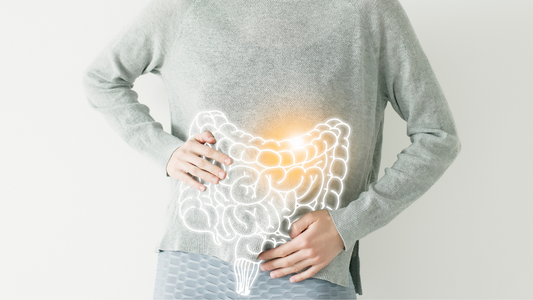The Role of Vitamin D in Mental Health

If you are struggling with your mental health, you are not alone. In fact, one in five people in Canada will experience a mental health problem or illness, and by age 40, about half the population will have had a mental illness. [1]
Vitamin D, also called the “sunshine vitamin,” has long been known for its essential role in the maintenance and development of healthy bones and teeth. More recently, new research has highlighted its role in helping keep the immune system strong. But did you know that vitamin D may also play a role in mental health?
This blog explores vitamin D and mental health and how they are correlated, based on recent studies.
How Does Vitamin D Affect the Brain?
Vitamin D activates genes that regulate the immune system and releases dopamine and serotonin, which affect brain health. [2]
Dopamine and serotonin are two well-known neurotransmitters (chemical molecules involved in many bodily and nervous system functions). Dopamine controls motor function, motivation, and reward and reinforcement. Serotonin is involved in mood, memory, appetite, and sleep.
Researchers have discovered vitamin D receptors in the brain in the same regions that are linked to depression. [3]

What is Vitamin D Deficiency?
There’s a reason it’s called the “sunshine vitamin.” Our bodies naturally absorb vitamin D through direct exposure to the sun. But because most Canadians don’t get much sun in the winter, they may be at risk of low levels of vitamin D.
Vitamin D deficiency can occur when your body does not absorb the recommended levels. Vitamin D deficiency may lead to both physical and psychosocial problems. [4]
Vitamin D and Mental Illness
Studies have linked vitamin D deficiency and depression. In a 2013 review, researchers found that study participants with depression also had low vitamin D levels. [5] The researchers concluded that because vitamin D is important to healthy brain function, low levels of this nutrient may play a role in depression and other mental illnesses. They also found that people with low vitamin D levels were at a much greater risk of depression.
This was further supported by another review study conducted in 2015, which showed that people with symptoms of anxiety or depression had low levels of calcidiol, a byproduct of vitamin D in the body. [6]
Another 2017 study showed that taking vitamin D supplements improved mood, specifically depression and anxiety, in women with type 2 diabetes. [7]
There may even be a correlation between low vitamin D levels and seasonal affective disorder (SAD). SAD is a type of depression that occurs when the days get shorter in the fall and winter. [8]
One possible explanation for the correlation between vitamin D deficiency and depression is that many groups who are at a high risk of depression are also more likely to have a vitamin D deficiency. For example, adolescents, people with obesity, the elderly, and people with chronic illnesses are the most prone to having vitamin D deficiency. These groups are also at a higher risk of depression.
Some symptoms of depression may include withdrawal and social isolation. With less time spent outside, these individuals lack the much-needed sun exposure to process enough vitamin D.
There continues to be research on whether vitamin D supplementation should be explored as a possible treatment option for people with mental health issues.
While studies continue to be done on vitamin D and mental health, it’s important to know that vitamin D deficiency can have a detrimental effect on your health overall. For more information on vitamin D deficiency, read our Ultimate Guide to Vitamin D.
Takeaway
Your mental and physical health are both very important, and vitamin D plays an important role in each. Insufficient vitamin D levels can lead to health problems and is associated with depression. To learn more about your own vitamin D levels, or if you are struggling with mental health issues, speak with your physician or a mental health professional.
Bonus: Add Some Sunshine to Your Day
Studies show that music can have a positive influence on your mental health [9], so we’ve curated a collection of songs just for you. Listen to the Sunshine Vibes playlist on Spotify here.
References :
- Canadian Mental Health Association. Fast facts about mental health and mental illness [Internet]. 2021 [cited 2021 Nov 29]. Available from https://cmha.ca/brochure/fast-facts-about-mental-illness/
2. Eyles DW, et al. Vitamin d3 and brain development. Neuroscience. 2003; 118(3):641-53.
3. Eyles DW, Smith S, Kinobe R, et al. Distribution of the vitamin D receptor and 1 alpha-hydroxylase in human brain. J Chem Neuroanat. 2005; 29(1):21-30.
4. Murray M, Pizzorno J. 2012. The encyclopedia of natural medicine (3rd ed.). Atria.
5. Anglin RES, Samaan Z, Walter SD, et al. Vitamin D deficiency and depression in adults: Systematic review and meta-analysis. Br J Psychiatry. 2013; 202(2):100-7.
6. Bičíková M, Dušková M, Vítků J, et al. Vitamin D in anxiety and affective disorders. Physiol Res. 2015; 64(Supple 2):S101-3.
7. Penckofer S, Byrn M, Adams W, et al. Vitamin D supplementation improves mood in women with type 2 diabetes. J Diabetes Res. 2017; 2017:8232863.
8. National Institute of Mental Health. Seasonal affective disorder [Internet]. [cited 2021 Nov 26]. Available from https://www.nimh.nih.gov/health/publications/seasonal-affective-disorder
9. Miranda D, Gaudreau P, Debrosse R, Morizot J, Kirmayer LJ. Music listening and mental health: Variations on internalizing psychopathology. Music, health, and wellbeing. 2012:513-29.
 Free returns & exchanges
Free returns & exchanges



